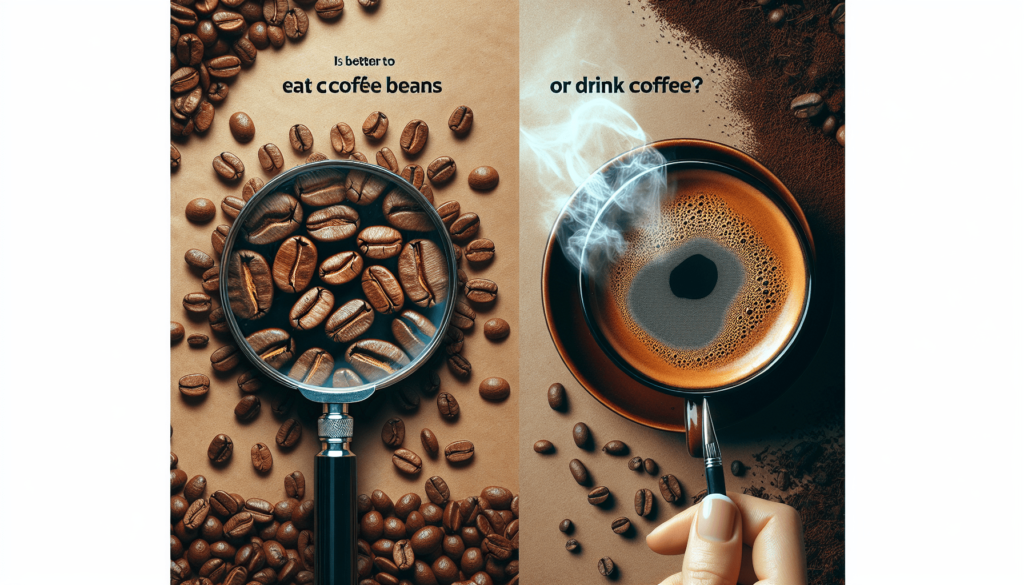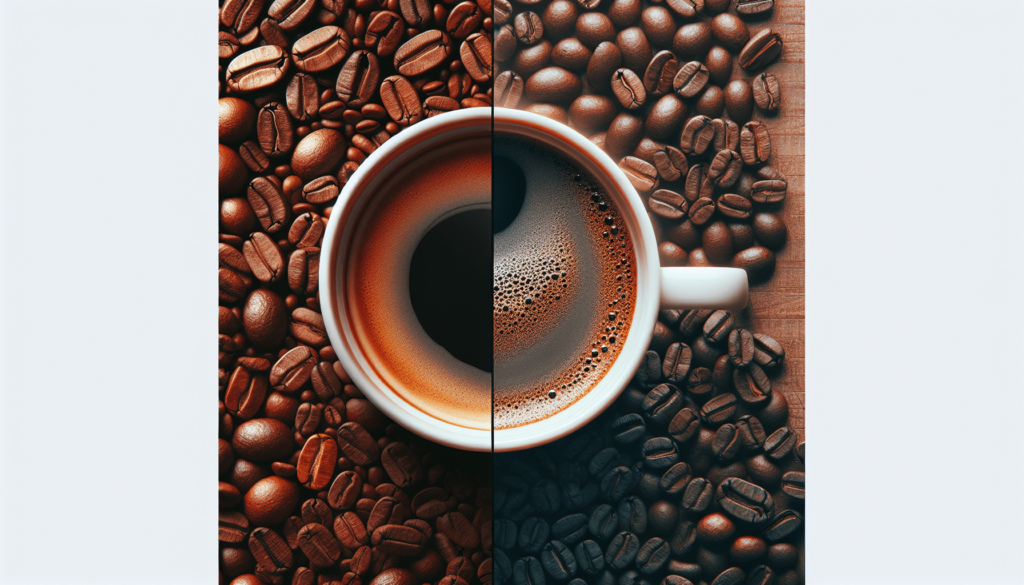Have you ever wondered if it’s better to eat coffee beans or drink coffee? The allure of coffee is universal—whether it’s for that morning pick-me-up or a leisurely afternoon delight. However, with coffee beans readily available and sometimes even included in chocolate treats, the question does arise: which is the better option?

Understanding Coffee Beans and Brewed Coffee
Let’s start with understanding the two options you have—eating coffee beans or drinking coffee. Both stem from the same source, the coffee bean, but their consumption methods and effects can differ significantly.
What Are Coffee Beans?
Coffee beans are seeds from the coffee plant. They are usually roasted to different degrees, from light to dark, to create the beans you’re familiar with. These beans are ground to make the coffee you drink.
What Is Brewed Coffee?
Brewed coffee is made by grinding coffee beans and boiling them with water, allowing the water to extract flavors, oils, and other compounds. This beverage can vary widely based on bean type, grind size, and brewing method.
Nutritional Profiles
When deciding whether to eat coffee beans or drink coffee, it’s helpful to understand the nutritional profiles of each.
Coffee Beans: Nutritional Facts
| Nutrient | Amount per 10g (approx. 5-8 beans) |
|---|---|
| Calories | 25 |
| Carbohydrates | 2g |
| Sugar | 0g |
| Fiber | 1g |
| Protein | 0.5g |
| Fat | 1g |
| Caffeine | 95mg |
Brewed Coffee: Nutritional Facts
| Nutrient | Amount per 8oz (240ml) cup |
|---|---|
| Calories | 2 |
| Carbohydrates | 0g |
| Sugar | 0g |
| Fiber | 0g |
| Protein | 0g |
| Fat | 0g |
| Caffeine | 95mg |
Health Benefits
Both coffee beans and brewed coffee offer a range of health benefits, primarily due to their caffeine content and antioxidants.
Antioxidants
Both forms are rich in antioxidants, which can help reduce inflammation and protect against certain diseases. Coffee beans, because they aren’t processed further, tend to retain more of these beneficial compounds.
Caffeine Content
Surprisingly, the caffeine content is quite similar. However, because you consume the entire bean when eating it, you may feel the effects more quickly compared to drinking a cup of coffee.
Digestive Considerations
Your digestive system will react differently to coffee beans compared to brewed coffee.
Eating Coffee Beans
When you eat coffee beans, you’re ingesting a lot of insoluble fiber, which can help digestion but might cause gastrointestinal issues if consumed in large quantities.
Drinking Coffee
Brewed coffee offers soluble dietary fiber that can aid digestion but in smaller amounts. It is generally easier on the stomach compared to chewing on beans.
Practicality and Convenience
Thinking practically, both eating coffee beans and drinking coffee have their pros and cons.
Eating Coffee Beans
Coffee beans are portable and convenient as a quick snack. They don’t require brewing equipment and are easy to pop into your mouth on the go.
Drinking Coffee
Making and drinking coffee does require some equipment and time. However, it’s a ritual that many people enjoy, and it can be prepared in various ways to suit your taste.
Flavor Experience
The taste profiles of coffee beans and brewed coffee can be quite different.
Eating Coffee Beans
When you eat coffee beans, you experience the full, intense flavor of the roast. They can be bitter, but some find the crunch and burst of flavor enjoyable, especially when combined with chocolate.
Drinking Coffee
Brewed coffee offers a more balanced and customizable flavor. You can adjust the strength, add milk or cream, and sweeten it to your liking.

Customization and Variety
Customization options vary between eating coffee beans and drinking coffee, affecting your overall experience.
Coffee Beans
While limited in customization, coffee beans come in various roast levels and can be flavored or coated with chocolate.
Brewed Coffee
With brewed coffee, the customization possibilities are vast. You can use different brewing methods (French press, espresso, drip), bean types, grind sizes, and add-ins like milk, cream, and sweeteners.
Environmental Impact
The environmental footprint of your coffee habit can differ depending on your choice.
Coffee Beans
Minimal processing means lower energy consumption. However, if beans are individually packaged, this could increase waste.
Brewed Coffee
Brewing coffee requires energy and often involves disposable filters or pods, contributing to waste.
Economic Considerations
Your budget might influence your choice between coffee beans and brewed coffee.
Coffee Beans
Generally, purchasing whole beans can be more economical, especially if bought in bulk. They also have a longer shelf life.
Brewed Coffee
Depending on your preferred type (specialty vs. regular), brewed coffee can vary in cost. Specialized brewing equipment might also be an investment.
Potential Risks
While both options are generally safe, some risks should be considered.
Coffee Beans
Chewing coffee beans in moderation is generally safe. However, overconsumption can lead to increased caffeine intake, which might cause jitteriness, increased heart rate, or digestive issues.
Brewed Coffee
While generally safe, certain brewing methods can increase your exposure to cafestol and kahweol, compounds linked to increased cholesterol levels.
Energy Boost and Focus
Both eating coffee beans and drinking coffee can provide an energy boost, but your experience may vary.
Eating Coffee Beans
The faster release of caffeine from coffee beans can provide a quicker energy boost, making them an excellent option for a rapid pick-me-up.
Drinking Coffee
Brewed coffee offers a more prolonged energy release, helping you stay focused and energized over a more extended period.
Lifestyle Fit
Your lifestyle and habits may influence whether you prefer eating coffee beans or drinking coffee.
Coffee Beans
For someone always on the go, coffee beans offer a quick and straightforward solution. They are easy to carry and consume without needing preparation.
Brewed Coffee
For those who enjoy a more relaxed and ritualistic start to their day, brewed coffee offers a fulfilling experience. The process of brewing and savoring a cup can be quite satisfying.
Summary
Both eating coffee beans and drinking coffee come with their unique advantages and drawbacks. To summarize:
| Aspect | Coffee Beans | Brewed Coffee |
|---|---|---|
| Nutritional Content | Higher in fiber, same caffeine content | Lower in calories and fats |
| Health Benefits | High in antioxidants | High in antioxidants, more customized flavor options |
| Digestive Impact | Can be harsh on stomach | Easier on digestion |
| Practicality | Highly portable, no equipment needed | Requires equipment, offer a ritualistic experience |
| Flavor | Intense and crunchy | Balanced and customizable |
| Customization | Limited | Numerous options |
| Environmental Impact | Lower if bulk-purchased | May create more waste, depending on method |
| Cost | Generally economical | Can be more variable, may require equipment |
| Energy Boost | Quick release | Prolonged release |
| Lifestyle Compatibility | Great for quick, on-the-go consumption | Ideal for leisure and ritualistic habits |
So, is it better to eat coffee beans or drink coffee? It ultimately depends on your personal preferences, lifestyle, and health considerations. In the end, either choice can provide you with the wonderful benefits of one of the world’s most beloved sources of caffeine.
